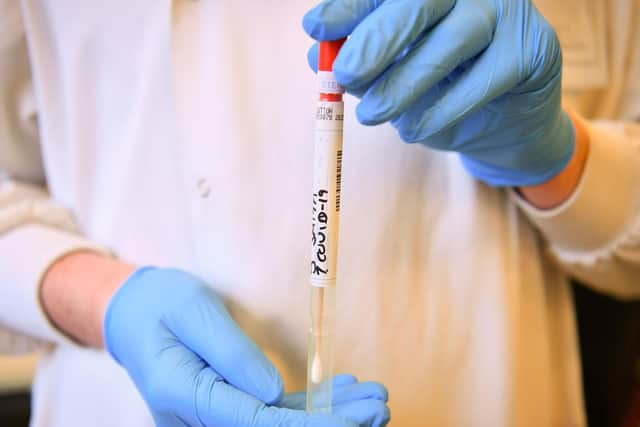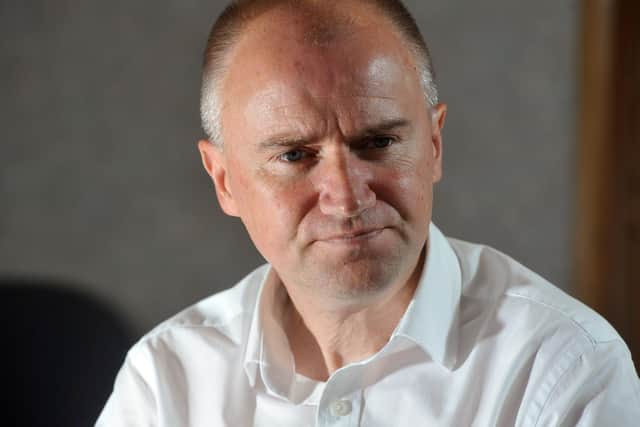Mutant strain of coronavirus now makes up one in five Leeds Covid cases
and live on Freeview channel 276
The strain was responsible for one in 20 cases before Christmas, but has risen sharply in recent weeks.
There were 355 new cases per 100,000 people in the prior seven days, according to the latest figures cited by Tom Riordan yesterday (Saturday), with nearly 15 per cent of tests returning a positive result.


Advertisement
Hide AdAdvertisement
Hide AdOn December 23, the Covid rate in Leeds was 144.7 per 100,000 people, with the positivity rate standing at 7.7 per cent on December 30.
Mr Riordan tweeted: "Latest Leeds case numbers are up to 355 per 100k and positivity at 14%. 5 deaths registered yesterday.
"The proportion of the new variant has gone up from 1 in 20 cases before Xmas to 1 in 5.
"If you can, stay at home. If you’re out, keep your distance and wear a mask indoors. Please."


Advertisement
Hide AdAdvertisement
Hide AdVirus mutations are common, but experts have said one of the variants discovered last year may be up to 70 per cent more transmissible.
The figures came as the official coronavirus death toll in the UK rose to more than 80,000 and lab-confirmed cases passed the three million mark.
Doctors have warned that pressure on the NHS could get worse in the coming weeks and some experts criticised the current lockdown measures as not being strict enough.
The number of patients with Covid-19 in hospital is also at a record high in England, and medics have warned the full impact of social mixing over the Christmas period has not yet been seen.
Advertisement
Hide AdAdvertisement
Hide AdThe Government has doubled down on its “stay at home” message by launching a new advert, fronted by England’s chief medical officer Professor Chris Whitty, urging everyone in England to “act like you’ve got” coronavirus.
Meanwhile, Buckingham Palace revealed the Queen and Duke of Edinburgh received their Covid-19 vaccinations on Saturday.
A royal source confirmed the injections were administered by a royal household doctor at Windsor Castle.
The pair, both in their 90s, are among the priority groups to be vaccinated in a rollout which aims to see all the most vulnerable receive a jab by mid-February.
Advertisement
Hide AdAdvertisement
Hide AdGovernment figures showed a further 1,035 people had died within 28 days of testing positive for Covid-19 as of Saturday, bringing the UK total to 80,868.
Separate figures published by the UK’s statistics agencies for deaths where Covid-19 has been mentioned on the death certificate, together with additional data on deaths that have occurred in recent days, show there have now been 95,000 deaths involving Covid-19 in the UK.
Official death figures continue to be affected by a lag in the publication of recent data and will contain some deaths that took place over the Christmas and New Year period that have only just been reported.
There had been a further 59,937 lab-confirmed cases of coronavirus in the UK.
Advertisement
Hide AdAdvertisement
Hide AdThe total number of lab-confirmed cases of coronavirus in the UK has reached 3,017,409, after a further 59,937 were confirmed in Government figures as of Saturday.
Cases were estimated to have been as high as 100,000 per day at the peak of the first wave in April.
But scientists advising the Government estimate there are currently more than 100,000 new infections per day and possibly higher than 150,000 which they believe puts the current number of daily cases at a higher level than ever during the pandemic.
They believe the current lockdown may lead to a plateau of cases of coronavirus across the UK rather than the dramatic cut seen following the March and April lockdown.
Advertisement
Hide AdAdvertisement
Hide AdMedics have warned things are likely to get worse before they get better for the health service.
Dr Simon Walsh, deputy chair of the British Medical Association’s consultants’ committee and a London-based emergency care doctor said the epidemiology from the previous wave indicates the situation is likely to deteriorate over the next two to three weeks.
He told BBC Breakfast: “I’m afraid all of us who are working on the front line believe – and this is based on the evidence, I’m afraid – that it is going to get worse before it gets better.”
Dr Justin Varney, director of public health at Birmingham City Council, said hospitals had still not seen the full extent of patients who caught coronavirus over Christmas.
Advertisement
Hide AdAdvertisement
Hide AdThe former GP told BBC Radio 4’s Today: “We still haven’t seen the impact in the NHS of the rapid rise that we saw around December 28-29 after the Christmas bubble and after we started to see the new variant arriving in the region.
“It is going to get a lot, lot worse unless we really get this under control but some of that is already baked into the system, and it is going to play out over the next week or two.”
The new Government advertising campaign will run across TV, radio, newspapers and on social media and will feature images of patients in hospital.
Prof Whitty said: “Vaccines give clear hope for the future, but for now we must all stay home, protect the NHS and save lives.”
Advertisement
Hide AdAdvertisement
Hide AdPrime Minister Boris Johnson added: “I know the last year has taken its toll – but your compliance is now more vital than ever.”
The current lockdown has been branded “too lax” by a member of the Scientific Advisory Group for Emergencies (Sage).
Susan Michie, professor of health psychology at University College London, said there is still “a lot of household contact” and that the “wide definition of critical workers” means “30-50% of (school) classes (are) full-up”.
Prof Michie, who is also part of Independent Sage, told Today: “It is definitely too lax, because if you think about it and compare ourselves with March, what do we have now?
Advertisement
Hide AdAdvertisement
Hide Ad“We have the winter season and the virus survives longer in the cold, plus people spend more time indoors and we know aerosol transmission, which happens indoors, is a very big source of transmission for this virus.
“And secondly, we have this new variant which is 50-70% more infectious. You put those two things together, alongside the NHS being in crisis, we should have a stricter rather than less strict lockdown than we had back in March.”
Professor Robert West, a participant in the Scientific Pandemic Influenza Group on Behaviours (SPI-B) and also part of Independent Sage, echoed her words, saying the current lockdown rules are “still allowing a lot of activity which is spreading the virus”.
Asked if he thinks they should change, he told BBC News: “Yes, I do. Not just me. I think probably most of the people I talk to, epidemiologists, and medical scientists and virologists.”
Advertisement
Hide AdAdvertisement
Hide AdDavid Nabarro, a World Health Organisation (WHO) special envoy working on Covid-19, said any tightening should be considered in a targeted way.
He told Times Radio: “The most important thing at this stage is to do very careful sifting of the data to answer the question who is getting infected, where are they getting infected, how are they getting infected so that the additional measures, if they are going to be put in place, can be targeted.”
Mr Nabarro said there will be “a bit more difficulty to weather” in the months ahead in terms of the virus.
He said: “It’ll be many months I fear, so I am encouraging everybody, whilst they’re feeling this frustration and some sense of despair, at the same time to find the extra resolve to keep going because if we loosen our defences and if we don’t lock our arms together holding this virus at bay, the situation will get a lot worse.”
Advertisement
Hide AdAdvertisement
Hide AdWith the current lockdown and vaccine rollout, deaths from coronavirus are expected to start dropping in February, while hospital admissions should fall after that.
Coronavirus cases are expected to drop in the spring due to vaccination plus the fact people spend more time outdoors, making it harder for the virus to spread.
The approval of the Moderna vaccine by the Medicines and Healthcare products Regulatory Agency on Friday means the UK will have three jabs to use when it comes on stream in spring.
